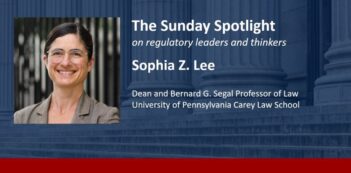
Cost-benefit analysis, Europe’s E. coli outbreak, health care antitrust, environmental regulation, and more … as discussed in our top analysis posts from 2011.
As 2011 draws to a close, The Regulatory Review reflects back on a year of major regulatory developments around the world. For our daily essay today, as well as our essays for yesterday and tomorrow, we will feature the top 50 essays in The Regulatory Review over the past twelve months, based on the number of page views. Today we feature the top analysis essays from among our top overall essays, while yesterday we featured the top news essays and tomorrow we will feature the top opinion essays.
Alberto Alemanno | June 15
More than ten days have passed since Germany reported a significant increase in the number of patients with hemolytic uremic syndrome (HUS), a disease generally associated with gastrointestinal infections caused by E. coli bacteria. The contamination source has yet to be identified, but this outbreak of a rare strain of the bacterium E.coli O104:H4 has already proven to be the deadliest in history.
 European Court of Justice Considers Carbon Restrictions on Foreign Airlines
European Court of Justice Considers Carbon Restrictions on Foreign Airlines
Hannah Bill | August 3
Both international travelers and legal scholars should be interested in a recent hearing before the European Court of Justice (ECJ), since the outcome may affect the cost of air travel and the rules of customary international law.
 The Privatization of Regulation in the World Economy
The Privatization of Regulation in the World Economy
Tim Büthe | May 24
An ever-increasing share of economic activity is governed by international rather than domestic rules or standards, often developed by private bodies. Frequently, such global private regulation entails no market competition among multiple rulemakers. Instead, a single organization serves as the clear institutional focal point in its area of expertise and is largely uncontested in making the rules for global markets. As a result, once such a private-sector body develops a standard, it becomes the global rule.
 Debate Heats Up Over Regulation’s Costs to the Economy
Debate Heats Up Over Regulation’s Costs to the Economy
Thomas Cockriel | April 7
 Open Government and Its Impact
Open Government and Its Impact
Cary Coglianese | May 8
“Open government” is one of those bumper sticker phrases with which nearly everyone agrees. But what does open government really mean? And what difference does it actually make?
 Measuring Regulatory Activity: What Can We Learn From the Unified Regulatory Agenda?
Measuring Regulatory Activity: What Can We Learn From the Unified Regulatory Agenda?
The U.S. Chamber of Commerce has warned of an impending “regulatory tsunami” that “poses … the single biggest challenge to jobs, our global competitiveness, and the future of American enterprise.” But how many new regulations do federal agencies actually have in the works?

Steven Gillard | February 14
 Agency Calculations of the Value of Statistical Lives Saved
Agency Calculations of the Value of Statistical Lives Saved
Robert Jackel | May 27
As the Obama Administration seeks to reduce the regulatory burden on businesses (see related The Regulatory Review essay), the dollar value its regulatory agencies place on human life has garnered considerable attention.
In his speech before the US Chamber of Commerce yesterday, President Obama reminded his audience that he has ordered federal agencies to fix or repeal any “regulations that are needlessly stifling job creation and economic growth.” But Obama’s order – officially known as Executive Order 13,563 – did more than order a government-wide review of existing regulations. It also contained language reiterating that federal agencies can consider the values of “equity” and “distributive impacts” when developing new regulations.
 Senate Bill Would Codify Benefit-Cost Analysis and Add Guidance Procedures
Senate Bill Would Codify Benefit-Cost Analysis and Add Guidance Procedures
Penn Program on Regulation | March 25
Last week, Senator Susan Collins (R-ME) introduced the Clearing Unnecessary Regulatory Burdens Act (S. 602), a bill that would require agencies undertaking significant regulatory actions to submit cost-benefit analyses of those actions.
 Preemption of Vaccine Injury Lawsuits Upheld
Preemption of Vaccine Injury Lawsuits Upheld
Theodore Ruger | April 5
Few issues of medical science and tort liability have riled public disagreement like that of vaccine safety in the past two decades. Despite an overwhelming scientific and medical consensus that common childhood vaccines are safe and effective, and that their public health benefits far outweigh their incremental risks, many members of the public and the news media have perpetuated the notion that various dire diseases – most notably autism – are caused by vaccines.
 The EPA Transport Rule’s Positive Net Benefits
The EPA Transport Rule’s Positive Net Benefits
Richard Schmalensee and Robert N. Stavins | April 22
The U.S. Environmental Protection Ag
ency (EPA) is developing new rules to regulate the interstate transport of sulfur dioxide(SO2) and nitrogen oxides (NOX) emitted from electric power generation facilities. EPA’s regulatory proposal – the Clean Air Transport Rule (Transport Rule) – is designed to help communities that are generally downwind of major emissions sources comply with air quality standards and, in the process, provide health and environmental benefits to upwind and downwind communities alike.
 Obama’s Ozone Decision Shows Clearly Who’s in Charge
Obama’s Ozone Decision Shows Clearly Who’s in Charge
Stuart Shapiro | September 8
 FTC Loses Bid to Block Labcorp-Westcliff Merger
FTC Loses Bid to Block Labcorp-Westcliff Merger
Abigail Slater | April 5
 FTC Issues Pay-for-Delay Report
FTC Issues Pay-for-Delay Report
Abigail Slater| May 17






